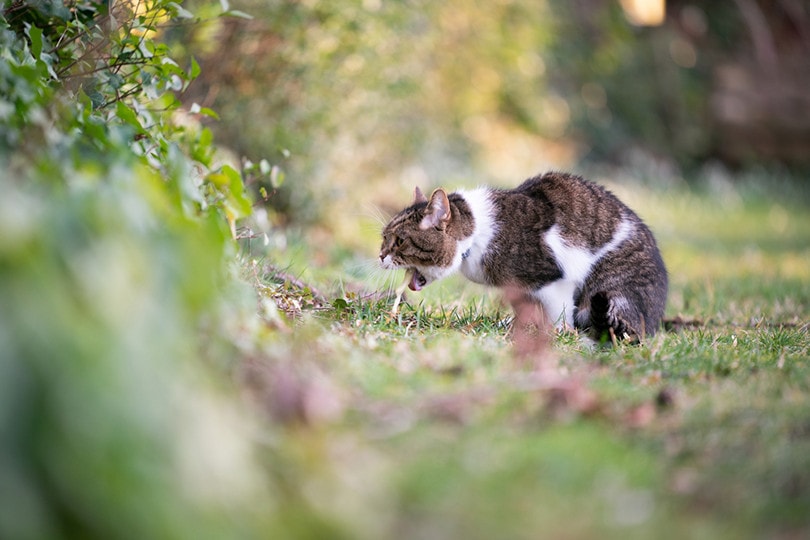
Click to Skip Ahead
If your kitty likes to accompany you to the kitchen, you should familiarize yourself with what’s safe for them to eat and what’s not. Some foods, such as milk, aren’t inherently toxic to cats, but yours may be lactose intolerant and become sick on just a small amount. Some things, such as fish and squash, are usually safe to feed your cat and can add supplemental nutrition to their diet. Other ingredients, such as chocolate, are toxic to all cats and should absolutely be avoided. Almost any scrap will give them indigestion in large amounts, however, so you should limit even their healthy snacks to a sample-sized portion just to be safe. Here are 11 foods that are toxic to cats in any circumstance.
The 11 Foods That Are Toxic to Cats
While some snacks are okay in moderation, you should never let your cat have even a hint of these dangerous delicacies.
1. Alcohol
It should go without saying, but no amount of alcohol is safe for your cat or dog. Whether it’s beer, wine, or spirits, your pets should stay out of the liquor cabinet.

2. Artificially Sweetened Drinks or Desserts
There are so many artificial food additives and sweeteners on the market nowadays that it’s impossible to have detailed studies available on every one of them. We do have conclusive evidence that at least some of them are harmful to pets, however. Xylitol is the most notorious. This artificial sweetener is often found in chewing gum, toothpaste, peanut butter, and some desserts. In dogs, xylitol can cause severe hypoglycemia and liver failure. Recent studies suggest that it may not have such deleterious effects in cats, but some sources still bear the warning so it’s best to avoid it entirely until more information is known. Either way, xylitol and other artificial sweeteners aren’t exactly healthy for your cat.
3. Avocado
Well, isn’t this the pits? Luna can’t sample any avocado toast because the fruit contains a toxin called persin. In fact, every part of the plant contains this poison, so you might want to keep an eye on your kitty if you have an avocado tree, too.
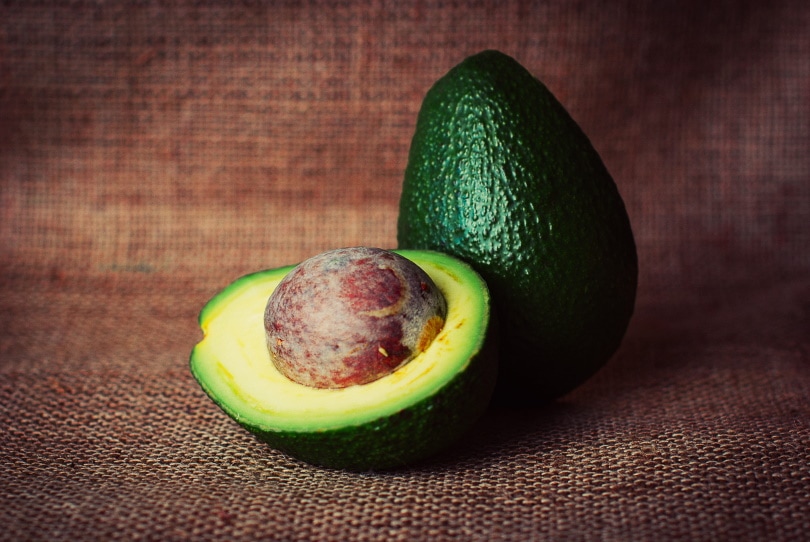
4. Chocolate
Like dogs, cats can’t process chocolate. The theobromine and caffeine in chocolate affects their digestive system and can also change their heart rhythm, increase their blood pressure, and damage their neurological system, possibly resulting in seizures. While all types of chocolate are off-limits, dark chocolate and baker’s chocolate are especially dangerous since they’re more concentrated with theobromine. With white chocolate, which contains almost no cocoa solids, the risk of chocolate poisoning is extremely low, but the fat content can have serious negative effects on your cat.
5. Citrus
Most cats are repelled by the idea of lemons and limes, and for good reason. All members of the citrus family are toxic to cats. In addition to clearing away the orange cream, you’ll also need to be mindful about growing citrus near your cat and using household products containing citrus essential oils. Fortunately, cats generally don’t like the smell of citrus and have no problem staying away. In fact, some products intentionally use citrus oils to deter your cat from entering certain areas, but you’ll want to be sure not to spray them in your cat’s face or let them ingest the contents. Neither citrus essential oils nor any other essential oils can be used near your kitten since the majority of them are highly toxic.

6. Garlic
As a member of the poisonous Allium plant family, you’ll want to steer clear of this common ingredient. Plants in this family all contain compounds that cause red blood cell damage in cats and dogs, which can be fatal. Unfortunately, garlic is such a prevalent seasoning that it might be hidden in some seemingly innocent dishes, such as grilled steak.
7. Onions
Whether they’re green or red, raw or cooked, all types of onions should be avoided. Onions are part of the allium family as well, and even onion powder, a common seasoning, is not safe for cats. Even bulbed flowers such as the Amaryllis that are in the Allium family are toxic to cats.
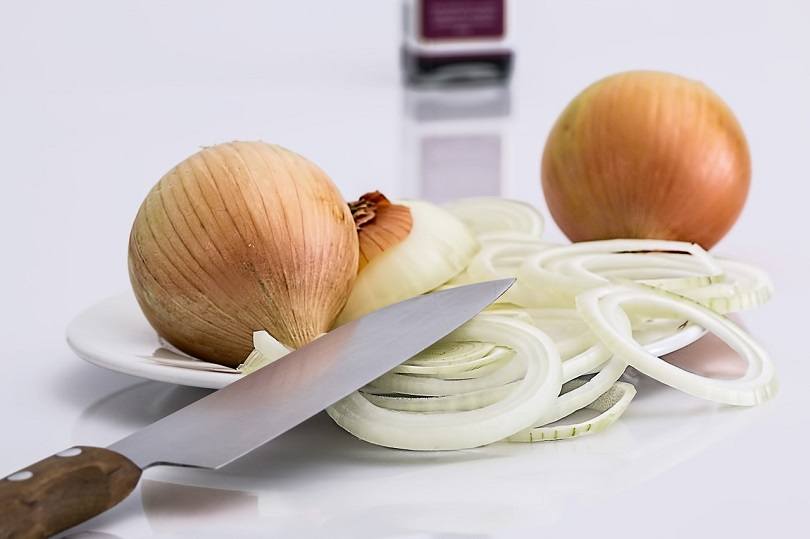
8. Chives/Leeks/Shallots
Avoid giving your cat chives, leeks, or shallots and any dishes containing them. Like garlic and onions, these are also part of the Allium family.
9. Grapes
Unlike with some foods, we still can’t explain exactly what the chemical is in grapes and raisins that spells bad news for our feline friends. However, a recent 2022 study on dogs has shed some light on this and proposes that the toxic component in grapes and raisins is tartaric acid. The toxicity in cats is not as established as in dogs, but it’s still best to avoid them since they’ve been linked to kidney failure.
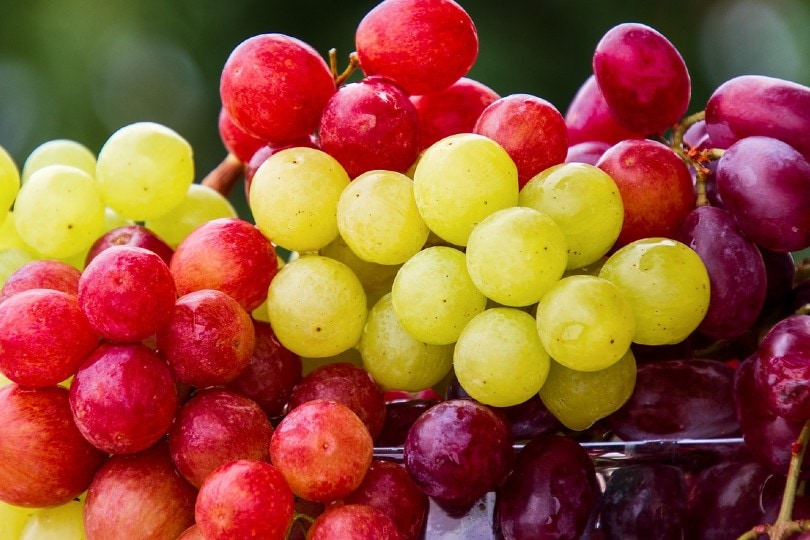
10. Macadamia Nuts
These nuts aren’t fully understood. They’re an excellent source of healthy fats for humans but can cause vomiting, diarrhea, lethargy, and even collapse in dogs. There are no reports of toxicity in cats, but it would still be a food item to avoid since its high fat content is not recommended at all for our kitties.
11. Some Raw Meat
If you want to start your cat on a raw meat diet, we recommend talking to your veterinarian about the pros and cons. However, we’re not warning you about the raw meat in a natural diet carefully crafted for cats, or discussing whether your outdoor cat should eat a freshly killed rat. We’re talking about meat from the grocery store that’s been sitting on the shelf for possibly a week or more before it makes it to your refrigerator. That meat can carry salmonella and a host of other illnesses that you’d do best to avoid.

What to Do If Your Cat Eats Something Toxic
So, what do you do if a grape slips off the counter and you can’t catch it in time? Many curious cats have made themselves sick by eating things that are bad for them, but every accidental bite doesn’t always manifest in illness.
For the next several hours, you should keep a close eye on your cat and call the vet if they show any of these signs of poisoning:
If possible, let your vet know how much they ate, and when. Never try to induce your cat to vomit at home. Unfortunately, there isn’t a safe way to get your kitty to puke, so if your vet determines that they ate too much of a poisonous substance, you’ll most likely need to bring them in for treatment.
The 5 Snacks You Might Want to Limit, or Avoid
Some ingredients may not send you packing for the vet but may still cause problems with your pet. Here are a few other foods that, while not necessarily toxic, may not be good for your cat.
1. Bread
Carbs aren’t your kitty’s friend. Cats are obligate carnivores, which means it’s necessary for them to eat meat to survive. While domestic cats can tolerate low amounts of fruits and veggies, their tummies don’t really have the capacity to process indulgent carbs like pancakes or cookies.
2. Chicken Wings
While your cat can enjoy a few pieces of plain cooked chicken, we recommend avoiding chicken wings because of the risk of small bones becoming lodged in their intestines. Plus, traditional wing sauce isn’t good for them, either.
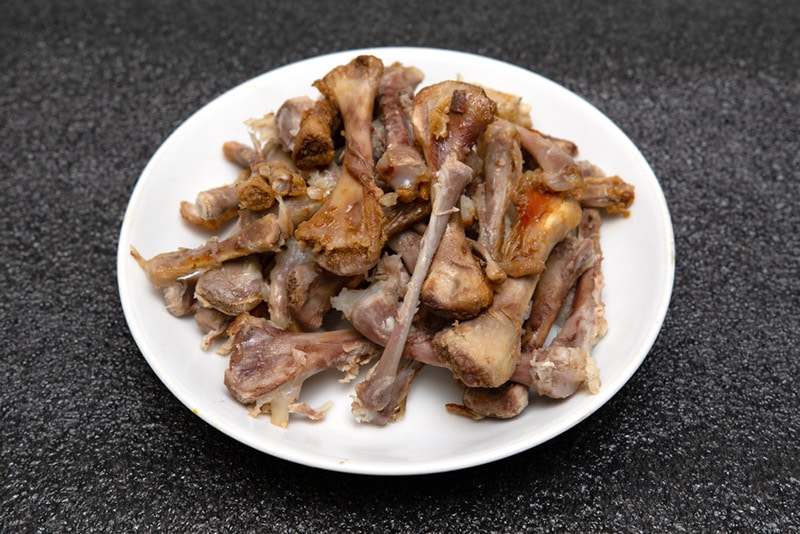
3. Dairy
A little bit of milk probably won’t hurt your cat, but many felines are lactose intolerant. That’s because they’ll lose their ability to process lactose as they grow older. Even so, the high amount of sugar and fat isn’t good for your cat, so you should only feed them a small amount if you do at all. Goat’s milk is actually a better choice than cow’s milk and gives them helpful probiotics to support a healthy gut.
4. Nuts
Some nuts, such as almonds, walnuts, and pecans, simply pack a lot of fat into a small serving, which may cause digestive upset in even tiny amounts.
5. Sugar
Did you know that the majority of cats in the United States are overweight? Sugar directly causes inflammation and puts your cat at a heightened risk of obesity. Plus, you’re not really indulging your cat when you give them a sugary snack since they actually lack the taste buds to process sweets.
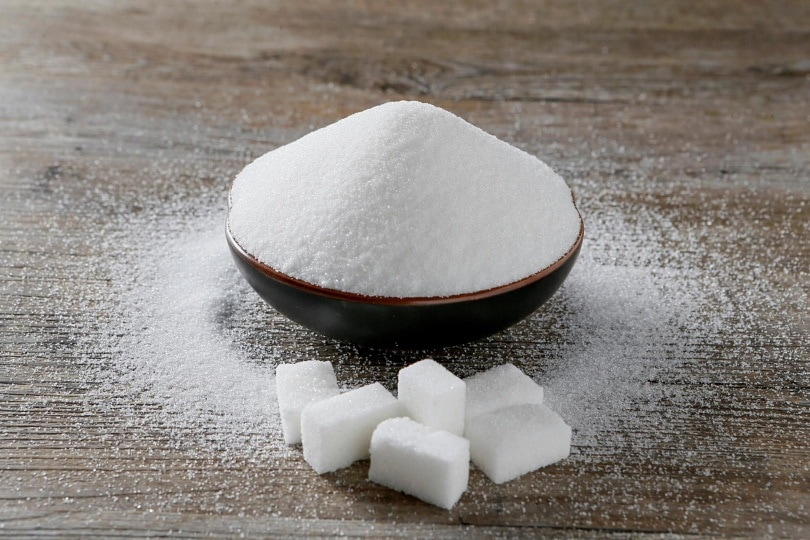
Healthy Snacks for Cats
Thankfully, not everything in the refrigerator is forbidden. In addition to their regular diet, you can let your cat have a few bites of these tantalizing treats. Remember, moderation is the key, so you only want to give them a taste.
1. Apples
Fresh apple slices provide your cat with beneficial vitamin C. Always avoid the seeds, however, since they contain cyanogenic glycosides and also pose a choking hazard.
2. Bananas
Your cat may go bananas for this fruit, which is a good thing since it’s a source of potassium.
3. Berries
As long as they aren’t a choking hazard, your cat can enjoy the whole summer crop of strawberries, blueberries, and blackberries. You should slice them into bite-sized pieces for your cat’s convenience.

4. Cantaloupe
Cats are strangely attracted to cantaloupe because it has a slightly meaty scent. While cantaloupe contains compounds that are good for them, you should slice off the rind unless you want to have a full litter box in the morning.
5. Pumpkin
A small scoop of pumpkin can settle your cat’s stomach on a bad day and promote healthy digestion on a regular basis. Skip the pumpkin spice, however, since it contains toxic ingredients such as nutmeg (and doesn’t usually have pumpkin anyway).

6. Scrambled or Boiled Eggs
Whether they’re scrambled, boiled, or fried, eggs boost your cat’s protein levels. Just make sure they’re fully cooked to avoid the risk of salmonella.
7. Squash
While they may be notoriously afraid of its cousin the cucumber, cats may eat squash in moderation. Yellow or summer squash has a soothing effect similar to pumpkin, which makes sense because pumpkin is actually a type of squash.
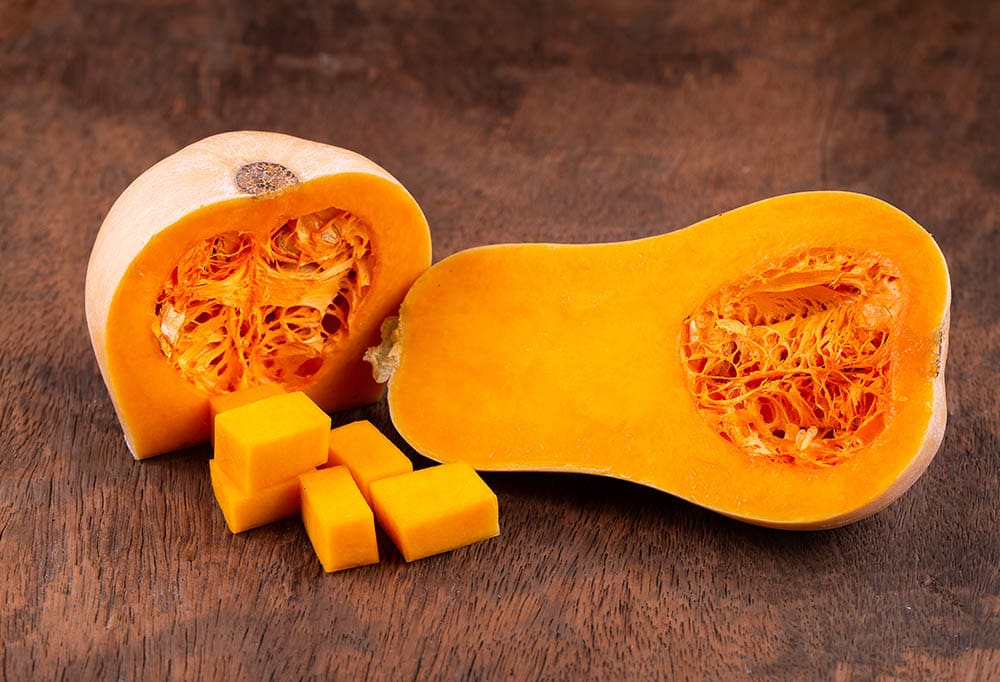
8. Sweet Potato
A popular ingredient in grain-free diets, sweet potatoes are considered a super food that supplies your cat with fiber, vitamins, and antioxidants. Even so, you should only give them a nibble because cats are obligate carnivores that don’t eat much plant-based food in the wild, if they do at all. Plus, the high fiber content can give your cat diarrhea in excess.
9. Unseasoned, Thoroughly Cooked Meat
Turkey, fish, chicken, pork, beef…all of these are excellent options to feed your cat, as long as they’re fully cooked and free from seasonings. Remember, garlic in all of its forms are toxic, and so is sodium in high levels, so you want to be absolutely certain that there are no added ingredients.
Conclusion
Your pantry certainly shouldn’t have an open-door policy for your cat. While some human foods are okay to feed to your cat in moderation, other ingredients are highly toxic. Opting for healthy cat treats from the shop is another great way to indulge your kitty. Always ask your veterinarian if you have questions on what or how much to feed your cat to promote a healthy lifestyle.
Featured Image Credit: Nils Jacobi, Shutterstock








